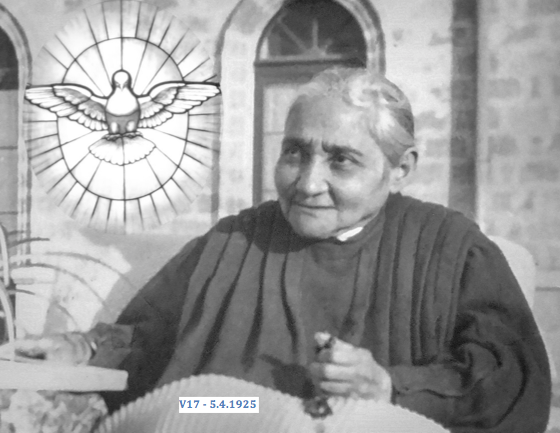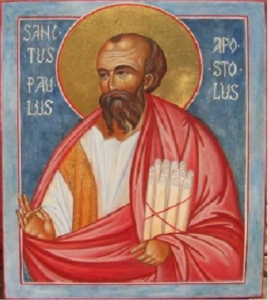“Only love is what transforms the soul into God and makes her one with Him…love alone is what triumphs over all human imperfections, consumes what prevents the soul from taking divine Life in God.”
Love is the coefficient that multiplies everything. It is the only reality that grows by sharing. Love is an undeserved gift that generates a spiral of growing life. It asks for everything in order to give everything. It is the beginning and the end. Love, Jesus affirms in the Diaries of Luisa (vol. IX – May 20, 1909), is superior to everything else. There is nothing that can surpass Love – neither doctrine nor dignity, and much less nobility.
The fifteen characteristics of love mentioned in the Ode to charity of St. Paul are the portrait of God. The gift of the Holy Spirit puts us on the path to live and love as God does. In fact, the purpose of our life is to reach, aspire to, and walk on this road in order to arrive at, each one of us in our own measure, this truth of ours as children of God. But to be children, the creature must die to herself in order to live only in Jesus; everything must be done for His love. Charity is a virtue that gives life and splendor to all of the others, so Jesus asks the creature: “Be careful, then, and let your works, even the least ones, be invested by charity – that is, in Me, with Me and for Me” (vol. I). Divine love is in search of all creatures in order to love them. Jesus says to Luisa (vol. XXXI – September 18, 1932) that the life of each creature in time had its beginning, but in His Supreme Being it had no beginning. And she was loved by God with a love without beginning and without end. Now living in His Will is exactly this: to feel flowing in all of your being the light, the divine strength, and the life of His Will. God feels the irresistible need of love to go in search of everyone and everything, because His divine nature is love and must love. His love has the virtue to love everyone, to extend itself to everyone and everywhere. God, therefore, desires so much that the creature be the repeater of His love. What’s more, in all that God did for the creature, the first motive, the first act was love; but what gave life and gives life to everything is the Divine Will. This is why Jesus says (vol. XXVIII – August 12, 1930) that one who wants to find true life must come into His Will, in which one will find the fullness of His Love. The soul will acquire the prerogatives of His Love which are: fecund love, love that rises, love that embraces everything, love that moves everything in love, unsurpassable and endless love, love that loves and conquers all.
Charity, therefore, leads us to do everything for everyone. So to understand the true value of love, we must learn to live and conform ourselves ever more to Christ, the true model of charity. We must make sure that our life is permeated by love, but a love that goes in the direction of God – hence, living in the Divine Will. Jesus confirms all this when (vol. IV – June 15, 1902) He declares that love has this of its own: it forms one object out of two, one will out of two. So the soul who loves Him forms one single thing with Him, one single will. Then again He clarifies (vol. VI – June 23, 1905) that one who is united with His Humanity already finds herself at the door of His Divinity, because His Humanity is a mirror for the soul from which the Divinity is reflected in her. If one is in the reflection of this mirror, it is natural that all of her being be transmuted into love; because everything that comes out of the creature, even the movements of her eyes, lips, thoughts, and all the rest – everything should be love and done out of love. Since His Being is all love, wherever He finds love He absorbs everything within Himself, and the soul dwells safely in Him like someone in their own palace. Therefore, only by living in the Divine Will can true love be found. Jesus, therefore, warns and tells us (vol. VII – January 20, 1907) that until the soul is buried in His Will to the point of dying completely by dissolving all of her will within His, she cannot rise again to new Divine Life through the rising of all the virtues of Christ which contain true Sanctity. Therefore, let His Will be the seal which seals your interior and exterior; and once His Will has risen completely within you, you will find true love.
To Luisa, who asked Him to be “all love”, Jesus explains (vol. VII – November 6, 1906) that by living in His Will, the soul acquires the most heroic love and reaches the point of loving Him with His own love. She becomes all love and becoming all love, she is in continuous contact with Him. So, she is with, in, and for Him; she does everything He wants, nor does she move or desire anything but His Will in which all the love of the Eternal One is enclosed. By living in this way, the soul almost comes to the point of dissolving faith and hope because as she comes to live in the Divine Will, the soul no longer feels in contact with faith and hope. Since she lives in the Will of God, what does she have to believe if she has already found It? And what does she have to hope for if she already possesses It? God is a complex of love and a continuous act of love which never ceases to love, and when He finds His love in the creature, He finds Himself.
What can love, animated by an Omnipotent Fiat, not do (vol. XXXIV – January 1, 1937)? It acts as a magnet and draws God in an irresistible way. It removes every dissimilarity. With its heat, it transforms and embellishes in such an incredible way that Heaven and earth feel themselves enraptured to love. Not loving a creature who loves the three Divine Persons is impossible for God. All of His divine power and strength are rendered impotent and weak before the conquering strength of one who loves God. Love, animated and nourished by the Divine Will, transforms the soul into God. Even this important concept is clarified by Jesus in the Diaries (vol. XI – August 28, 1912). The other virtues, as high and sublime as they may be, always cause the creature to be distinguished from her Creator. Only love is what transforms the soul into God and makes her one with Him. So Love alone is what triumphs over all human imperfections, consumes whatever impedes it in order to let the soul take divine life in God. However, there cannot be true love if it does not receive life and nourishment from the Divine Will. So it is His Will that, united with love, forms the true transformation in Jesus. The soul remains in continuous contact with His power, Sanctity, and all that He is; therefore, she can say that she is another Jesus.
In light of this knowledge, the last statements of St. Paul (1 Co. 13:8-10) acquire the right significance: “Love does not come to an end…For our knowledge is imperfect and our prophesying is imperfect; but once perfection comes, all imperfect things will disappear.” This means that love is perfection, the fulfillment of everything. So everything else will end, but not love. “When I was a child, I used to talk like a child, and think like a child, and argue like a child, but now I am a man and all childish ways are put behind me” (1 Co. 13:11). Indeed, we become spiritually adults when we learn to love as God loves. “Now we are seeing a dim reflection in a mirror, but then we shall see face to face. The knowledge that I have now is imperfect; but then I shall know as fully as I am known” (1 Co. 13:12); it means that I love God as God loves me, so I am equal to Him by Grace.
Again Jesus enlightens us regarding this when He affirms (vol. VI – October 16, 1905) that the closer the soul comes to the end in order to draw near the fount of every good, which is the true and perfect love of God in which everything will remain submerged and love alone will float to be the engine of everything, the more the soul will lose all the virtues she practiced along the journey, to enclose everything in love and rest from everything – through love alone. The more she advances, the less she feels the varied crafting of the virtues because, investing them all, love converts them all into itself, keeping them at rest within itself like many noble princesses, working, itself alone, and giving life to all of them. And while the soul does not perceive them, in love she finds them all, but more beautiful, pure, perfect, and ennobled. Therefore, Jesus encourages us along the journey because the more we move forward, the sooner we will enjoy, in advance even down here, the eternal beatitude of sole and true love.
Again St. Paul exhorts us (1Cor 15:28): “May God be everything in everyone” (ut sit Deus omnia in omnibus), therefore: “Without charity I am nothing (nihil), with charity I am all (omnia) like God”.
FIAT
Tonia Abbattista (Click here for website)

